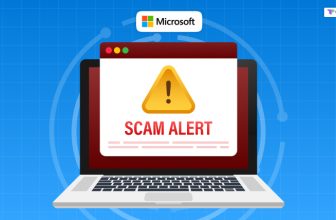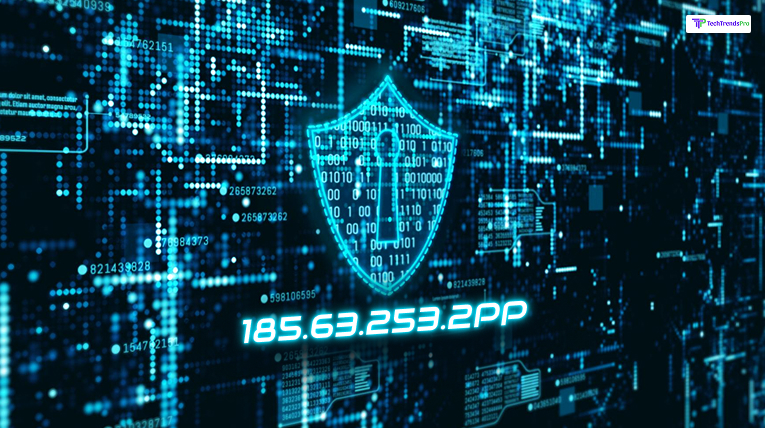
If you’ve come across the phrase “185.63.253.2pp”, you may be left bewildered, asking what it is. Is it an address for a server? A tracking code? A virus? A typo?
Don’t worry, you’re not alone. On the face of it, it appears to be a normal IP address—185.63.253.2—but the “pp” at the end confuses most. In this tutorial, we’ll dissect it all in a way that’s clear, uncomplicated, and useful—no degree in technology needed!
We’ll explore what 185.63.253.2pp really is (or isn’t), how it works, what it might be used for, and how it fits into the bigger picture of cybersecurity and IT infrastructure.
What Is 185.63.253.2pp?
Let’s start with the basics.
- 185.63.253.2 is a standard IPv4 address, which is used to identify a specific device or server on the Internet.
- The “pp” portion, though, is not typical. IP addresses are not encoded with letters. So when you notice 185.63.253.2pp, it probably indicates:
- A personalized string appended by a website or software.
- A malicious redirect or scam mark.
- A tracking parameter in suspicious websites.
So in reality, 185.63.253.2pp isn’t a real IP address. But it’s something you may encounter in suspicious URLs, spam emails, or tracking links. And that’s where it gets interesting.
How Does 185.63.253.2pp Work?
In most instances, suspicious strings such as 185.63.253.2pp are:
- A component of a cloaked URL intended to deceive users.
- Utilized in malware campaigns or phishing redirects.
- Added into browser URLs to fake authenticity.
A scammer or hacker can take a legitimate-looking IP such as “185.63.253.2” and then add extra characters (such as “pp”) to:
- Build subdomains or spoof servers.
- Mask the real source of a malicious link.
- Monitor your actions if you follow it.
So, “185.63.253.2” could be a genuine server address, but “185.63.253.2pp” is probably a fake or altered version.
Common Uses of 185.63.253.2pp (or Similar Strings)
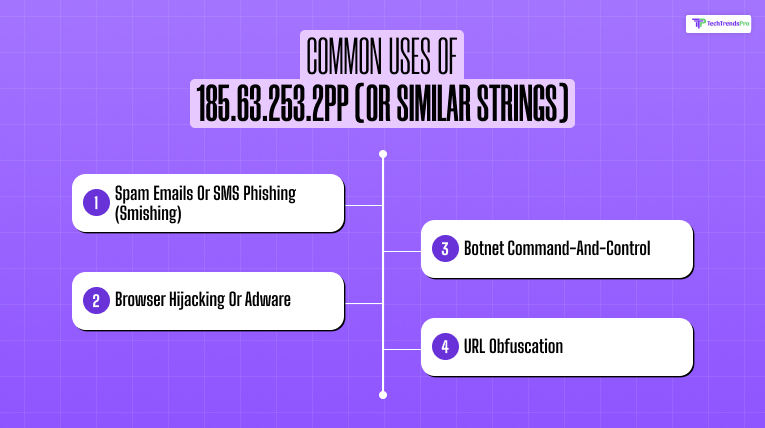
You may encounter 185.63.253.2pp under the following circumstances:
1. Spam Emails or SMS Phishing (Smishing)
Cyber attackers might include URLs such as http://185.63.253.2pp.net/confirm to trick you into clicking.
2. Browser Hijacking or Adware
Occasionally, browser add-ons or suspicious websites inject altered IP strings to reroute traffic.
3. Botnet Command-and-Control
Some malware families employ certain IP-like patterns to interact with central control servers.
4. URL Obfuscation
The “pp” may be a part of a lengthy subdomain, such as: pp.185.63.253.2.example.ru This hides the actual location of the danger.
Cybersecurity And IT Infrastructure Significance
Although “185.63.253.2pp” is not a correct IP address standing alone, identification of these patterns is significant for cybersecurity professionals and IT managers. Here’s why:
1. Pattern Recognition
Cybersecurity software searches for unconventional IP types or unusual domain strings to identify threats.
2. Threat Intelligence
Having insight into strings such as “185.63.253.2pp” being potential threats assists security teams in marking phishing campaigns and diverting malware.
3. Blocking Malicious Links
Firewalls and content filters can also blacklist malformed or suspicious URLs to block employee access.
4. Education
Educating users to identify malformed links or IPs with out-of-the-box extensions aids in lowering phishing success rates.
Detecting The Source And Authenticity Of 185.63.253.2pp
If you find a link or mention of “185.63.253.2pp,” you need to verify the following:
- Perform a WHOIS Lookup: On the root IP 185.63.253.2, this allows you to look up who the IP owner is and if it’s associated with a real company or service provider.
- Use Online Resources such as:
- VirusTotal
- AbuseIPDB
- IPVoid
- Examine the Full URL Context: Is it from a bank? Social media? A random text? Legit businesses won’t send links with suspicious characters.
- Verify Certificates and HTTPS Validity: If it leads to a page that lacks HTTPS or has an invalid certificate, that’s a warning signal.
Advantages And Disadvantages Of Using Or Engaging With 185.63.253.2pp
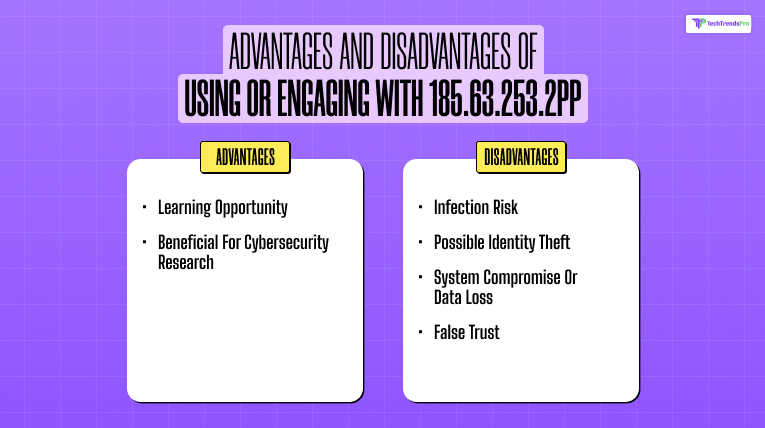
Let’s get real—there are barely any benefits to interacting with or using something like 185.63.253.2pp.
Advantages
- Learning Opportunity: Detection of malformed or suspicious strings enhances your threat intelligence.
- Beneficial for cybersecurity research: Researchers can investigate such addresses for malware tracking or botnet activity.
Disadvantages
- Infection risk if you click on a malicious link.
- Possible identity theft via phishing.
- System compromise or data loss if malware is downloaded.
- False trust if it appears to be a legitimate Microsoft or service-related IP.
Real-Life Applications And Scenarios
Below are some real-world scenarios in which 185.63.253.2pp (or similar strings) may appear:
1. Fake Microsoft Support Pop-Ups
A pop-up claiming to be from Microsoft could point to 185.63.253.2pp-support.com and tell you to call an imposter number.
2. Crypto Scam Redirects
Opening a phishing link in a Telegram crypto group may direct you to an impersonated wallet page with the domain name in the 185.63.253.2pp format.
3. Social Engineering Campaigns
Fraudsters send messages stating, “Your account has been suspended. Please go to http://185.63.253.2pp/login to fix it.”
The Future Of 185.63.253.2pp And Similar Threats
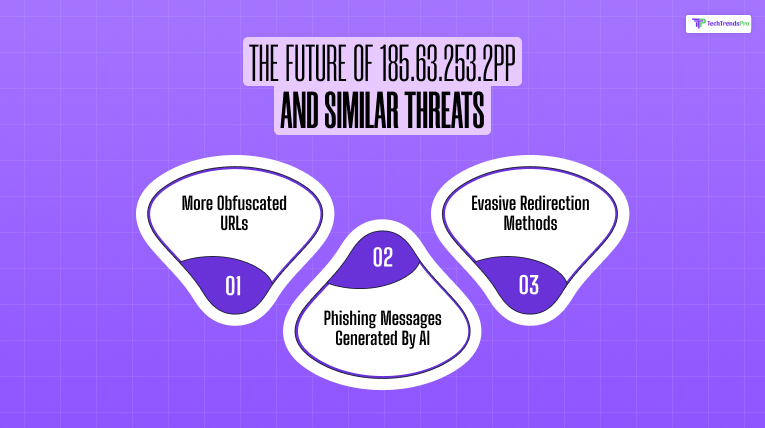
Cyber threats continually mutate. As individuals become wiser to classic phishing, the attackers become more innovative. This is what we can look forward to:
- More obfuscated URLs through the same formatting tricks.
- Phishing messages generated by AI that appear horrifyingly genuine.
- Evasive redirection methods through IP-like strings.
Tools like browser security features, spam filters, and AI-driven anomaly detection will mitigate such risks in the future.
But the most effective defense? Human awareness.
Be Smart, Be Skeptical
So, what’s the bottom line?
“185.63.253.2pp” isn’t a valid IP address—but it symbolizes an increasing trend in malicious digital deception. It is no where to the IPv4 private IP address, that is 10.24.1.53, which is within the Class A private IP block.
Whether it’s contained within a link, utilized in a suspicious email, or routed through insidious domains, you should view it as a warning sign.
Stay current. Hover over links. Employ security tools. And if unsure—don’t click. Your online safety starts with curiosity, and by reading this—you’re already ahead of the game.
Additional Resources:




